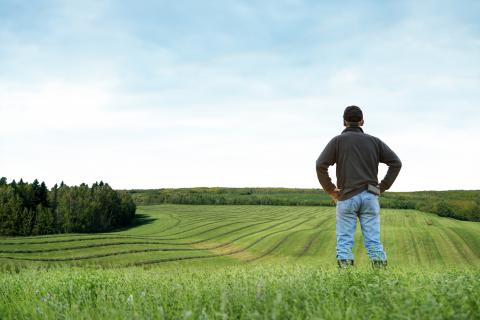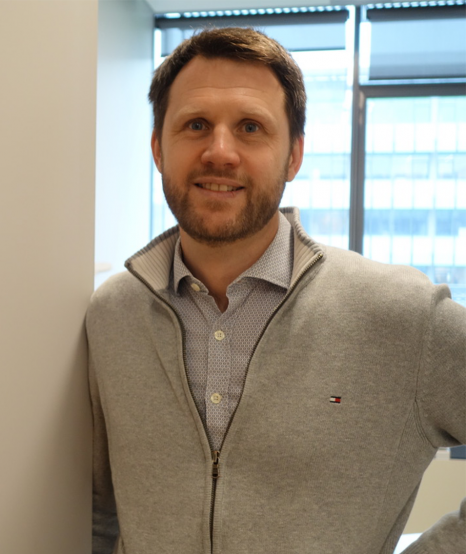
Vincent Martinet: finding a sustainable balance between mankind and the natural world
Vincent Martinet is Director of Research at the Paris-Saclay Applied Economics laboratory (PSAE – Univ. Paris-Saclay, INRAE, AgroParisTech), guest lecturer at ENS Paris-Saclay and Deputy Research Director at the Graduate School of Economics & Management, Université Paris-Saclay. His work focuses on areas from environmental and natural resource economics to sustainable development and the search for environmentally friendly models of production and consumption.
Vincent Martinet has been an agricultural engineer for twenty years. It all started in 1999. After studying for a 2-year preparatory class, he passed the agriculture exam and joined AgroParisTech. There, thanks to Jean-Christophe Bureau, he discovered ecology, followed by natural resource economics. He graduated with an engineering degree in 2002. After completing a Master in Environmental and Natural Resource Economics, he focused on the issue of sustainable development in his thesis, which was supervised by Gilles Rotillon at Université de Nanterre. He defended it in 2005 and received the Chancellerie des universités de Paris prize in recognition of his work.
Sustainable management of fisheries
The young researcher then decided to study for a post doctorate at the Department for Maritime Economics in Ifremer, Brest. “I worked for two years on the economics of fisheries and their sustainable management.” Ecologists and mathematicians worked together for the first time in Brittany. “I created dynamic models in order to study the economic, ecological and social issues involved in rebuilding fisheries facing difficulties.” Following this, he continued focusing on the sustainable management of fisheries in the context of international projects aimed in particular at informing public decision-making in Chile and Peru – countries where this sector is of greater economic and social significance than in France.
Career development
In 2007, the economist was taken on by INRAE as a research fellow and joined the Public Economics Laboratory, where he has remained ever since – with exception of when he was completing a second post doctorate in Canada in 2010. “Even though I didn’t spend any time abroad before I was recruited, INRAE made sure it happened afterwards. As a result, I set off to spend a year at HEC Montreal and joined the Groupe d’études et de recherche en analyses de decisions (GERAD), a study and research group which specialises in decision analysis. This international environment was very stimulating. I return there regularly as I’ve continued to work with many of the people.” The young researcher also took the opportunity to write a book on the economics of sustainable development, which was published in 2012. That same year, he obtained his ‘habilitation à diriger des recherches’ (authorisation to direct the research of others – a post-doctoral degree) and four years later became a Director of Research. Vincent Martinet has been teaching on part of the Master 2 in Environmental Economics since 2008. In 2020, he was the first to enjoy the new role of guest lecturer at ENS Paris-Saclay, a position which is reserved for researchers at INRAE.
Economics for agricultural, environmental and food issues
He currently works at the Paris-Saclay Applied Economics laboratory (PSAE). Its focus is economics applied to agriculture, the environment and food. Around sixty researchers, academic staff and PhD students also work there. The laboratory was created in 2022 as a result of merging the Public Economics (Univ. Paris-Saclay, INRAE, AgroParisTech) and the Food and Social Sciences (ALISS – Univ. Paris-Saclay, INRAE) units. It became part of the Saclay plateau in the summer of 2022 on the Agro Paris-Saclay campus.
The research work carried out covers the complete spectrum, from production to consumption, including the impact of production on the environment, studies of international sectors and markets, and the links between the environment, food and health. Researchers at PSAE are often called upon to help guide public policy. For example, they have taken part in the Priority Research Programme ‘Growing and Protecting Crops Differently’ within the framework of a future investment programme supported by the National Research Agency (NRA).
Modelling agroecological trends
Vincent Martinet’s research has two main areas of focus. The first is concerned with the measurement of sustainability and the issue of material degrowth. “At the moment, we cannot imagine a policy of sustainable development without considering issues to do with intragenerational inequality. In a recent scientific paper on the links between intragenerational equity and intergenerational equity, we show that to achieve intergenerational equity in an unequal world, it’s necessary to follow a trajectory of differentiated decline, with growth in poor countries and decline in rich countries. ”
The second focus of research is related to agroecology. This deals with the common ground between economics, agronomy and ecology. “We study the contribution made by ecosystem services through agricultural landscapes, their requirements and the public policies which should be put in place to encourage this. We’re interested, for example, in the link between the ecology of natural enemies of crop pests and the crop pests themselves, in the influence the structure and composition of the landscape has on these dynamics, and in the public policies which need to be put in place for farmers to change the structure of the landscape.”
Vincent Martinet works with ecologists and mathematicians to model these ecological dynamics. For two years, he has been jointly leading an expert group (ESCo INRAE) for the Ministries of Agriculture and Food, Ecological Transition, and Higher Education and Research. “We’re working on the natural regulation of pests. The aim is to see how to use agroecological drivers to protect crops and reduce the use of pesticides.”
A Graduate School (GS) at the interface of multiple disciplines focused on environmental protection
Vincent Martinet became Deputy Research Director at the Graduate School Economics & Management (2,000 undergraduate students, 23 Master students) in the summer of 2020. His task is to coordinate the twelve laboratories in the GS around a common scientific strategy, with a focus in particular on sustainable development. “Université Paris-Saclay has many possible connections within the fields of economy and management which should be developed. Research work is interdisciplinary and carried out by working with the fields of climate sciences, agronomy, ecology and engineering, and our colleagues at CEA, AgroParisTech and CentraleSupélec.” Global health is one of the emerging areas of focus. “This area examines the links between food and health using a joint perspective together with other disciplines. Other areas of focus include the protection of plants and animals in relation to human health and health management. They all address societal issues.”
Vincent Martinet and his colleagues are committed to uniting and leading teams from the institutes, institutions and laboratories which fall within the scope of the GS. In April 2022, the first international workshop dedicated to the economics and management of climate change allowed the GS to be noticed both at home and abroad. “Next year’s will be about global health.”
The course and research topics taught at the Graduate School attract, amongst others, students who are very aware of environmental issues. “Master programmes are turning down candidates from prestigious courses in France and abroad because we do not have enough places,” laments Vincent Martinet. However, he strongly encourages the student community to persevere. “Research is an amazing job. It provides unparalleled intellectual freedom, stimulates curiosity and develops creativity on a par with the artistic professions. We’re constantly trying to reinvent ourselves.”

